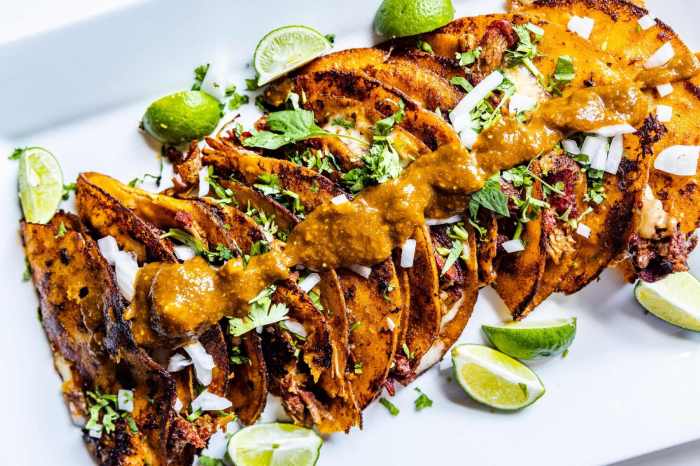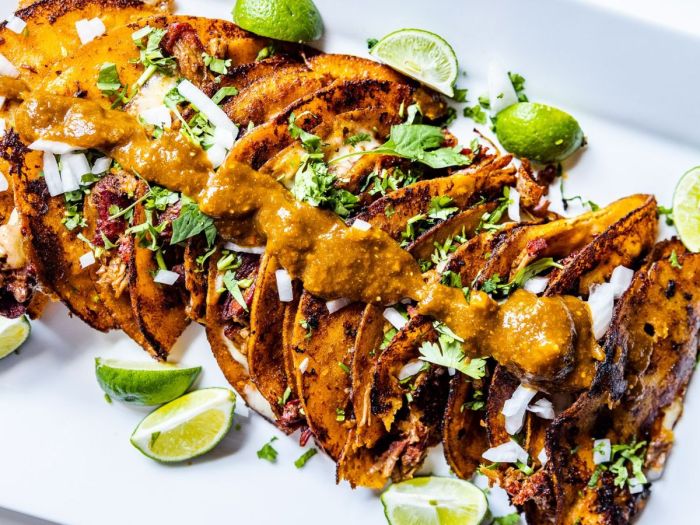
Micronutrient Profile of Birria Tacos

Birria tacos nutrition facts – Birria tacos, a popular culinary delight, offer a complex nutritional profile extending beyond the macronutrients (carbohydrates, proteins, and fats) often discussed. A closer examination reveals a significant contribution of various micronutrients crucial for maintaining optimal health and well-being. These nutrients are derived from the synergistic combination of ingredients, each contributing unique vitamins and minerals.The micronutrient content of birria tacos is largely determined by the specific recipe and ingredients used.
However, several key micronutrients are consistently present.
Vitamins and Minerals in Birria Tacos and Their Sources
The micronutrient composition of birria tacos varies depending on the specific recipe and ingredients used. However, several key vitamins and minerals are commonly found. The meat, typically goat or beef, provides a source of iron, zinc, and B vitamins such as niacin and vitamin B12. The addition of cheese contributes calcium and riboflavin. Garnishes like cilantro offer vitamin K and vitamin A, while onions contribute vitamin C and potassium.
- Iron (Fe): Primarily from the meat, essential for oxygen transport in the blood and preventing anemia.
- Zinc (Zn): Found in the meat, crucial for immune function, wound healing, and cell growth.
- B Vitamins (B12, Niacin, Riboflavin): Derived from the meat and cheese; these vitamins are vital for energy metabolism and neurological function. Vitamin B12 is particularly important for red blood cell formation.
- Calcium (Ca): Primarily from the cheese, essential for bone health and muscle function.
- Vitamin K: Contributed by cilantro, important for blood clotting and bone metabolism.
- Vitamin A: Also from cilantro, crucial for vision, immune function, and cell growth.
- Vitamin C: Provided by onions, a potent antioxidant that supports immune function and collagen synthesis.
- Potassium (K): Found in onions, vital for maintaining fluid balance and nerve function.
Health Benefits of Micronutrients in Birria Tacos
The presence of these micronutrients contributes to several potential health benefits. Adequate iron intake prevents anemia, while zinc supports a robust immune system. B vitamins are crucial for energy production and neurological health. Calcium is essential for strong bones, and vitamins A and K play vital roles in vision, immunity, and blood clotting. Vitamin C acts as a powerful antioxidant, protecting cells from damage.
Potassium contributes to healthy blood pressure regulation. However, it is crucial to remember that these benefits are only realized within the context of a balanced diet and healthy lifestyle. Birria tacos alone cannot provide all the necessary nutrients for optimal health.
Potential Deficiencies from Excessive Consumption
While birria tacos offer several micronutrients, excessive consumption can lead to potential nutritional imbalances. The high fat content of the meat and cheese can contribute to weight gain and increased risk of cardiovascular disease if consumed regularly in large quantities. The high sodium content, often present in the birria broth and cheese, can raise blood pressure in susceptible individuals.
Birria tacos, while undeniably delicious, are often high in fat and calories. For a healthier alternative, consider incorporating more whole grains into your diet, such as checking out the nutritional benefits of pearl barley nutrition facts which are a good source of fiber. Balancing your birria taco indulgence with nutrient-rich options like pearl barley can contribute to a more well-rounded and healthier eating plan.
Furthermore, the relatively low fiber content may contribute to digestive issues if other fiber-rich foods are not incorporated into the diet. A diet heavily reliant on birria tacos could lead to deficiencies in other essential nutrients not found in significant amounts in this dish, such as vitamin D, vitamin E, and certain essential fatty acids.
- High saturated fat intake: Increased risk of heart disease and weight gain.
- High sodium intake: Elevated blood pressure and potential cardiovascular problems.
- Low fiber intake: Digestive issues and potential constipation.
- Nutrient imbalances: Deficiencies in vitamins and minerals not abundant in birria tacos.
Impact of Preparation Methods on Nutritional Value

The nutritional composition of birria tacos is significantly influenced by the chosen cooking method. Variations in cooking techniques affect not only the overall calorie content but also the proportion of macronutrients (protein, fat, and carbohydrates) and the bioavailability of certain micronutrients. Understanding these differences is crucial for making informed dietary choices.
Comparison of Cooking Methods and Nutritional Content
Different cooking methods alter the fat content and overall caloric density of birria tacos. Slow cooking, for instance, tends to render more fat from the meat, resulting in a higher fat content in the final product compared to grilling, which allows excess fat to drip away. Frying, on the other hand, adds additional fat from the cooking oil, significantly increasing the overall calorie and fat content.
This impacts not only the total energy value but also the type of fat present, influencing the potential health implications.
Effects of Varying Fat Content
The type and amount of fat used in birria preparation significantly impact the nutritional profile. Using saturated fats, such as lard or certain types of vegetable oils, will result in a higher saturated fat content compared to using unsaturated fats like olive oil or avocado oil. Similarly, the amount of fat in the meat itself, influenced by the cut of meat used and the cooking method, directly affects the overall fat content of the final product.
High saturated fat intake is associated with increased risk of cardiovascular disease, whereas unsaturated fats, particularly monounsaturated and polyunsaturated fats, offer potential cardiovascular benefits. The amount of visible fat left on the meat after cooking, and whether or not it is trimmed, will also affect the final nutritional content.
Nutritional Comparison Table of Birria Taco Preparation Methods, Birria tacos nutrition facts
| Preparation Method | Calories (per taco, estimated) | Fat (g, per taco, estimated) | Protein (g, per taco, estimated) |
|---|---|---|---|
| Slow Cooked | 350-450 | 20-30 | 20-25 |
| Grilled | 300-400 | 15-25 | 20-25 |
| Fried | 400-500 | 25-35 | 18-22 |
Note: These values are estimates and can vary significantly depending on the specific ingredients, portion sizes, and cooking techniques used. Actual values may differ based on factors such as the type and cut of meat, the amount of added fat (e.g., oil), and the type of tortillas used. These estimates are based on commonly used recipes and average serving sizes.
Precise nutritional analysis requires laboratory testing of specific recipes.
Influence of Ingredients on Nutritional Value
The nutritional profile of birria tacos is a complex interplay of its constituent ingredients, each contributing significantly to the overall caloric density, macronutrient composition, and micronutrient content. Variations in these ingredients, even seemingly minor ones, can substantially alter the final nutritional value of the dish. Understanding these influences is crucial for consumers seeking to make informed dietary choices.The primary ingredients driving the nutritional profile are the meat (typically goat, beef, or lamb), the tortillas (corn or flour), the cheese (often Oaxaca or Chihuahua), and various toppings (onions, cilantro, salsa).
Each component possesses a unique nutritional fingerprint, and their combination determines the overall nutritional impact of the taco.
Ingredient-Specific Nutritional Contributions
The meat component is the largest contributor to protein and fat content. Leaner cuts of meat will result in a lower fat and calorie count compared to fattier cuts. For example, goat birria, often considered leaner than beef, will yield a lower total fat content per serving. The type of cooking method also influences the final fat content; slow-cooking methods may render some fat, while frying will inevitably increase the overall fat content.
Tortillas, whether corn or flour, significantly impact carbohydrate and fiber content. Corn tortillas are generally lower in calories and higher in fiber compared to flour tortillas, which are typically higher in calories and refined carbohydrates. Cheese adds a significant amount of fat and saturated fat, as well as protein and calcium. The type of cheese used influences the nutritional content.
Oaxaca cheese, for example, tends to be lower in fat compared to some other varieties. Finally, toppings such as onions, cilantro, and salsa contribute relatively small amounts of calories, but add vitamins, minerals, and fiber, thereby improving the overall nutritional profile.
Visual Representation of Nutritional Contribution
Consider a hypothetical 100-calorie birria taco. A text-based representation could illustrate the relative contribution of each ingredient as follows:Meat: 50 calories (primarily protein and fat)Tortilla (corn): 25 calories (carbohydrates and fiber)Cheese (Oaxaca): 15 calories (fat, protein, calcium)Toppings (onions, cilantro, salsa): 10 calories (vitamins, minerals, fiber)This representation is a simplification, and the exact caloric distribution will vary significantly depending on the specific ingredients and their quantities.
However, it effectively illustrates the dominant role of the meat and tortilla in determining the overall caloric value, while highlighting the smaller, yet still significant, contributions of the cheese and toppings. Replacing the corn tortilla with a flour tortilla could increase the carbohydrate content significantly, altering this ratio considerably. Similarly, using a higher-fat cheese will increase the fat and calorie contribution of the cheese component.
FAQ Summary: Birria Tacos Nutrition Facts
Are birria tacos a good source of protein?
Yes, birria tacos are a good source of protein, primarily from the meat. The amount varies depending on the size of the taco and the type of meat used.
Are birria tacos gluten-free?
Not inherently. Traditional corn tortillas are gluten-free, but some recipes may use flour tortillas, which contain gluten. Always check the ingredients of the tortillas used.
Can I make birria tacos healthier?
Absolutely! Choose leaner cuts of meat, use healthier cooking methods (e.g., baking instead of frying), and opt for whole-wheat or corn tortillas. Control portion sizes and be mindful of toppings.
How many birria tacos constitute a serving?
A serving size is typically 2-3 tacos, but this can vary based on individual caloric needs and the size of the tacos.